Updates and News.
Below on this page are the recent news about our group.
Below on this page are the recent news about our group.
Welcome at the website of the research group parallel and distributed systems at the Departement of Mathematics and Computer Science, University of Münster, Germany. We are interested in questions related to parallel and distributed systems. Please use the links in the navigation bar to obtain information about our research as well as members of the research group.
Wir freuen uns mitteilen zu können, dass wir auf der internationalen Top-Konferenz ACM SIGPLAN Conference on Programming Language Design and Implementation (Rank A*) dieses Jahr gleich zwei Arbeiten vorstellen konnten.
Bastian Köpcke stellte unsere GPU-Sprache Descend vor, die von Rust inspiriert eine sichere Programmierung von GPUs ermöglicht.
Ari Rasch stellte einen formal-basierten Ansatz zum Ausdrücken und Optimieren von datenparallelen Berechnungen vor, basierend auf unserer Theorie der Multi-Dimensionalen Homomorphismen. Die Arbeit ist insbesondere im Bereich der künstlichen Intelligenz von hoher Relevanz und in dem Top-Journal ACM Transactions on Programming Languages and Systems (TOPLAS) veröffentlicht.
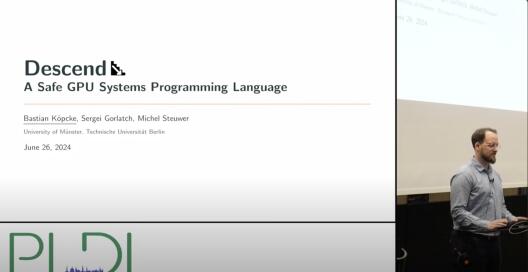
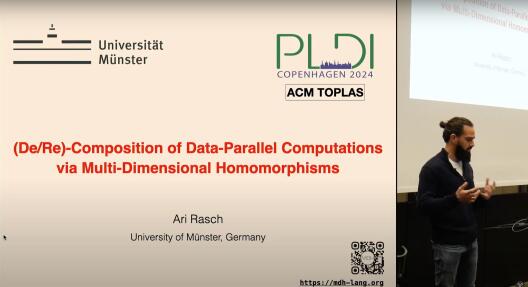
Unsere neuesten Arbeiten zu GPU/CPU-Optimierungen mithilfe sog. Scheduling-Sprachen wurden auf der prominenten ACM SIGPLAN 2023 International Conference on Compiler Construction von Ari Rasch und Richard Schulze in Montreal, Kanada vorgestellt:
(De/Re)-Compositions Expressed Systematically via MDH-Based Schedules
Autoren:
Ari Rasch (University of Münster, Germany)
Richard Schulze (University of Münster, Germany)
Denys Shabalin (Google Zurich, Switzerland)
Die Arbeit ist entstanden in Kollaboration mit Google Zürich, der Norwegian University of Science and Technology (NTNU), sowie der University of Utah, USA.
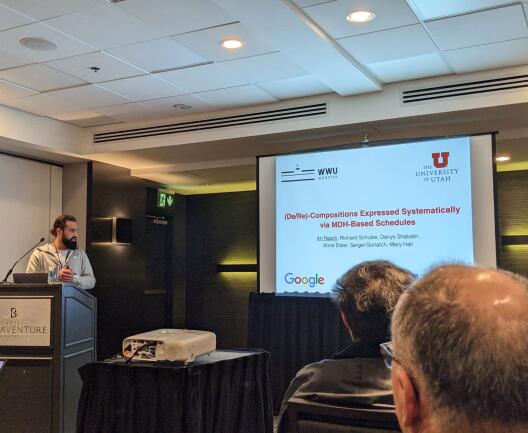
Das Lorentz-Zentrum ist ein Workshop-Zentrum in den Niederlanden, das wissenschaftliche Treffen für internationale Teilnehmer veranstaltet. Ungleich üblichen Workshops, zeichnen sich die Veranstaltungen des Lorentz-Zentrums durch eine offene und interaktive Atmosphäre aus, sowie durch eine hohe wissenschaftliche Qualität.
Unsere Arbeitsgruppe ist an der Organisation eines bevorstehenden Workshops im März 2022 maßgeblich beteiligt. Ziel des Workshops ist es, Technologien aus dem Bereich der automatischen Programmoptimierung (auch bekannt als auto-tuning) mit führenden internationalen Experten auf dem Gebiet zu diskutieren und offene Forschungsfragen zu identifizieren und anzugehen.
Unsere AG wird maßgeblich sowohl zur Organisation als auch zu den Diskussionen und Vorträgen des Workshops beitragen, gestützt durch unsere Arbeiten zu den Forschungsprojekten Auto-Tuning Framework (ATF) und Elevate. Vertreten wird die AG auf der Tagung durch: Richard Schulze (Teilnehmer), Johannes Lenfers (Teilnehmer), und Ari Rasch (Organisator).
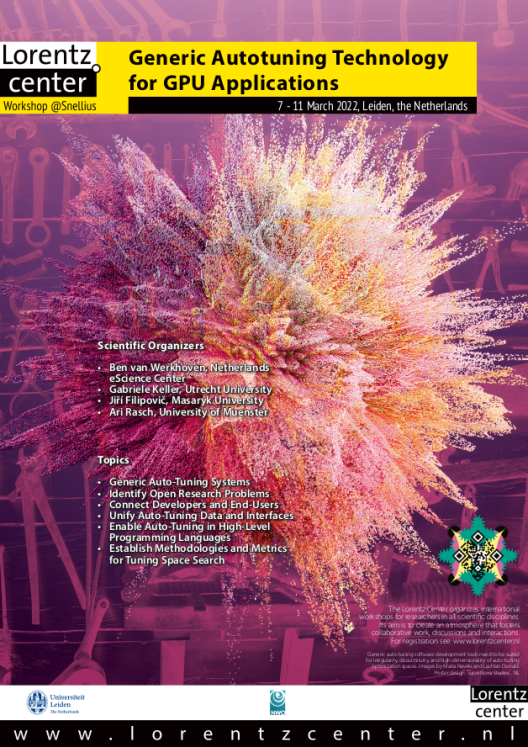
We are happy to announce that the German Research Foundation (DFG) has recently approved our application and will fund the research project with the above title for the period of 3 years, with a budget of approx. 600,000 € including overhead.
Deep learning (DL) is currently the most popular machine learning method used for solving a wide variety of real-world problems in both academia and industry. The success of DL applications critically depends on the quality of the software that implements DL algorithms on modern high-performance architectures such as multi-core CPU and Graphics Processing Unit (GPU).
Our project PPP-DL will develop a novel approach to automatic code generation and optimization for DL applications, based on the theory of Multi-Dimensional Homomorphisms (MDH) which has been actively developed in our research group. Using our MDH approach, we will address three fundamental challenges in code generation and optimization for DL: Performance, Portability, and Productivity (PPP).
The work in this project will be conducted by two full-time research assistants — Ari Rasch and Richard Schulze — supported by a student assistant, under the general coordination by Prof. Sergei Gorlatch.

The Special Interest Group on Programming Languages (SIGPLAN) of the Association for Computing Machinery (ACM) organizes world-wide top-conferences exploring programming language concepts and tools, focusing on design, implementation, practice, and theory. In addition, the ACM SIGPLAN annually awards few papers of exceptional quality as Research Highlights.
We are pleased to announce that our paper "Achieving high-performance the functional way: a functional pearl on expressing high-performance optimizations as rewrite strategies" (published at ICFP 2020, Rank A) was awarded as SIGPLAN Research Highlight.
"High-performance array code, for applications such as machine learning or image processing, needs both good algorithms and highly tuned code. While the algorithms are quite general, the tuning–involving optimisations such as tiling, vectorisation, and loop unrolling–is very platform specific. This paper cleanly separates those concerns, providing domain-specific languages for specifying the algorithm and the optimisations independently, with an optimisation language that supports abstraction and reuse properly for the first time. As a result we can enjoy elegance, and state-of-the-art performance, both at the same time. Sometimes we can have our cake and eat it too."
This work is the result of our ongoing cooperation with the universities of Glasgow and Edinburgh (UK), which will continue in the future.
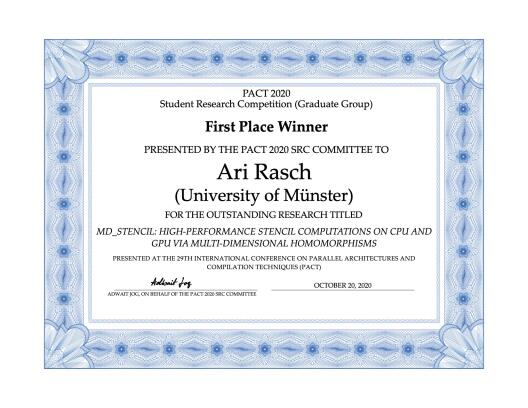


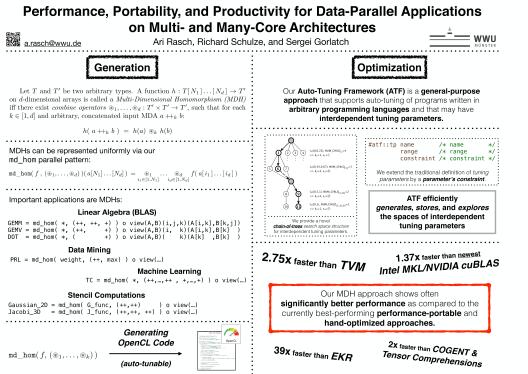

The ACM/IEEE International Symposium on Code Generation and Optimization (CGO) is one of the world’s top conferences in the area of software development, compilation and optimization.
We are pleased to announce that the highly renowned Best Paper Award of CGO 2018 has been awarded to our latest paper titled "High Performance Stencil Computations with Lift".
These are the authors:
M.Sc. Bastian Hagedorn – main author, PhD student in the parallel and distributed systems group (PVS) at the University of Muenster,
Prof. Sergei Gorlatch – Leader of the PVS group at the University of Muenster,
Dr. Michel Steuwer – Lecturer at the University of Glasgow, former PhD student in the PVS group,
M.Sc. Larisa Stolzfus – PhD student at the University of Edinburgh,
Prof. Christophe Dubach – Reader at the University of Edinburgh.
In the course of a festive ceremony, the award has been conferred to Bastian Hagedorn by the Program Chairperson of the symposium Mrs. Teresa Johnson (Google), see photo.
This work is the result of our ongoing cooperation with the universities of Glasgow and Edinburgh (UK) within the Lift Project, which will continue in the future. As part of this cooperation, we plan to offer topics for bachelor and master theses as well as student research projects.

